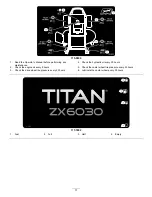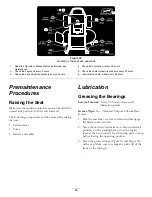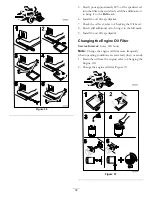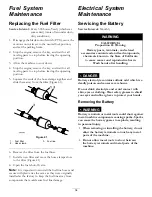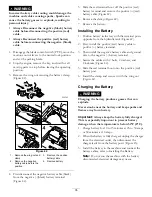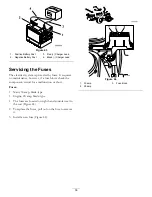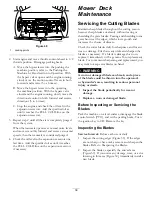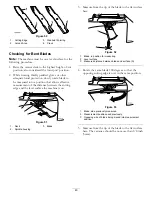
Using the Side Discharge
The mower has a hinged grass deflector that disperses
clippings to the side and down toward the turf.
DANGER
Without a grass deflector, discharge cover, or
complete grass catcher assembly mounted in
place, you and others are exposed to blade contact
and thrown debris. Contact with rotating mower
blade(s) and thrown debris will cause injury or
death.
•
Never remove the grass deflector from the
mower because the grass deflector routes
material down toward the turf. If the
grass deflector is ever damaged, replace it
immediately.
•
Never put your hands or feet under the mower.
•
Never try to clear the discharge area or mower
blades unless you move the blade control switch
(PTO) to the off position, rotate the ignition
key to off and remove the key.
•
Make sure the grass deflector is in the down
position.
Operating Tips
Fast Throttle Setting
For best mowing and maximum air circulation, operate
the engine at the fast throttle position. Air is required
to thoroughly cut grass clippings, so do not set the
height-of-cut so low as to totally surround the mower
by uncut grass. Always try to have one side of the
mower free from uncut grass, which allows air to be
drawn into the mower.
Cutting a Lawn for the First Time
Cut grass slightly longer than normal to ensure the
cutting height of the mower does not scalp any uneven
ground. However, the cutting height used in the past is
generally the best one to use. When cutting grass longer
than six inches tall, you may want to cut the lawn twice
to ensure an acceptable quality of cut.
Cut 1/3 of the Grass Blade
It is best to cut only about 1/3 of the grass blade.
Cutting more than that is not recommended unless
grass is sparse, or it is late fall when grass grows more
slowly.
Mowing Direction
Alternate mowing direction to keep the grass standing
straight. This also helps disperse clippings which
enhances decomposition and fertilization.
Mow at Correct Intervals
Normally, mow every four days. But remember,
grass grows at different rates at different times. So
to maintain the same cutting height, which is a good
practice, mow more often in early spring. As the grass
growth rate slows in mid summer, mow less frequently.
If you cannot mow for an extended period, first mow
at a high cutting height; then mow again two days later
at a lower height setting.
Cutting Speed
To improve cut quality, use a slower ground speed in
certain conditions.
Avoid Cutting Too Low
If the cutting width of the mower is wider than the
mower you previously used, raise the cutting height to
ensure that uneven turf is not cut too short.
Long Grass
If the grass is ever allowed to grow slightly longer than
normal, or if it contains a high degree of moisture, raise
the cutting height higher than usual and cut the grass at
this setting. Then cut the grass again using the lower,
normal setting.
When Stopping
If the machine’s forward motion must be stopped while
mowing, a clump of grass clippings may drop onto your
lawn. To avoid this, move onto a previously cut area
with the blades engaged.
Keep the Underside of the Mower
Clean
Clean clippings and dirt from the underside of the
mower after each use. If grass and dirt build up inside
the mower, cutting quality will eventually become
unsatisfactory.
Blade Maintenance
Maintain a sharp blade throughout the cutting season
because a sharp blade cuts cleanly without tearing or
25
Содержание 74833
Страница 50: ...Schematics G012083 Wire Diagram Rev B 50...
Страница 51: ...Notes 51...

